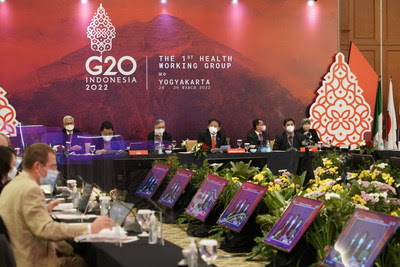SHANGHAI, April 5, 2022 /PRNewswire/ — Envision Group (Envision) announces that it has signed a Letter of intent (LOI) with Impact Energy Asia Development Limited (IEAD) for the supply of wind turbines to the iconic 600MW Monsoon Wind Project in Lao PDR. The wind farm will commence construction this year and is expected to achieve commercial operation in 2025. Once completed, it will be the largest wind farm in ASEAN as well as region’s first cross-border wind energy project.
The wind farm will be located in the Sekong and Attapeu provinces in Southern Lao PDR. Envision plans to supply 133 units of EN-171 wind turbines with a power rating of 4.51 MW. The Monsoon Wind Project will generate over 1,700 GWh of green energy each year. The project’s electricity generation will be delivered from Lao PDR to Central Vietnam through the project’s dedicated 500 kV transmission line.
Mr. Nat Hutanuwatr, Managing Director of IEAD, commented “As we are making excellent progress in developing the first and largest cross-border wind farm in South East Asia with a very competitive tariff, we are delighted to welcome Envision to join our exciting journey to deliver zero carbon electricity. Envision’s state-of-the-art technology for the proposed wind turbine solution and its successful execution track record will be key enablers for the project to achieve its objectives reliably and economically.”
The Monsoon Project has attracted global attention since its initial stages. IEAD’s affiliate, Impact Electrons Siam Company Limited (IES), started developing the wind farm in 2011 and IEAD signed a 25-year Power Purchase Agreement with Vietnam Electricity (EVN) in July 2021.
Envision is also collaborating with IES on IES’ development of the Xekong Wind Project, a further 1,000 MW wind farm on a site adjacent to the Monsoon Project. IES recently announced that it had obtained exclusive rights from the Government of Lao PDR to conduct a feasibility study and preliminary Environment Impact Assessment for the Xekong Wind Project.
About Impact Energy Asia Development Limited
Impact Energy Asia Development Limited (IEAD) is developing the Monsoon Wind Project and is 55% owned by Impact Wind Investment Limited and 45% by BCPG Public Company Limited, a leading renewable energy company in Thailand and Asia-Pacific.
About Impact Electrons Siam Limited
Impact Electrons Siam Limited (IES), is a pioneering renewable energy development firm headquartered in Thailand with over 1,900 MW of wind and solar energy projects in development and operation in Thailand, Japan, Lao PDR and Vietnam. IES is a privately owned company established in 2011. IES develops clean, affordable and reliable renewable energy solutions and is a pioneer of visionary innovation in the renewable energy sector with a vision to build a better future for communities across the region.
IES is leading the development of the Monsoon and Xekong wind farms in Southern Lao PDR, which will have an aggregate capacity of 1,600 MW. IES recently announced that the Monsoon Wind Power Project had signed a Power Purchase Agreement with Vietnam Electricity, with the project on schedule to achieve financial close during 2022.
For more information, please visit http://www.impactelectrons.com/
About Envision Group
Envision Group is a world-leading green technology company and net zero technology partner. With the mission of “solving the challenges for the sustainable future of humankind”. Envision designs, sells, and operates smart wind turbines and smart storage system through Envision Energy; AIoT-powered batteries through Envision AESC; and the world’s largest AIoT operating system through Envision Digital. It also owns Envision Racing Formula E team. Envision continues to promote wind and solar power as the “new coal”, batteries and hydrogen fuel as the “new oil”, the AIoT network as the “new grid”, the net-zero industrial parks to the “new infrastructure”, and to promote the construction and cultivation of green “new industry”.
Envision Group was ranked among the Top 10 of the 2019 ‘World’s 50 Smartest Companies’ by the MIT Technology Review. In October 2021, Envision was ranked second in the world on the Fortune “Change the World” list. Envision Group joined the global ‘RE100’ initiative and became the first company in mainland China committed to 100% renewable electricity by 2025.On April 22, 2021, Envision Group announced it will achieve carbon neutral in operations by 2022 and achieve carbon neutral throughout its value chain by 2028.
For more information, please visit www.envision-group.com
Logo – https://mma.prnewswire.com/media/747745/Envision_Logo.jpg


